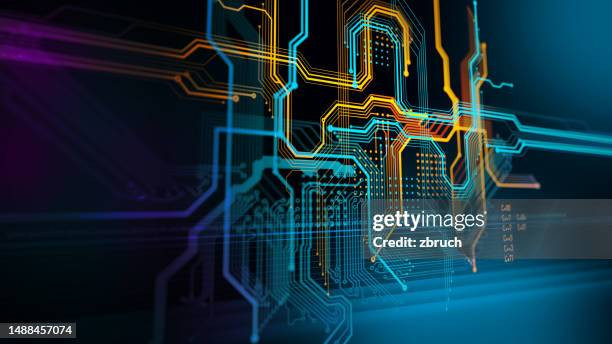By: Press Services
January 17, 2025
How Emerging Technologies are Shaping the Future of Business
The Role of Emerging Technologies in Transforming Business Operations and Growth
Coden, United States - January 9, 2025 / Digital Agency /
In an increasingly digital world, emerging technologies are reshaping the way businesses operate, innovate, and engage with customers. From artificial intelligence (AI) to blockchain and the Internet of Things (IoT), these technological advancements are not just enhancing existing business processes but are also creating new opportunities for growth. Companies that embrace these innovations are gaining a competitive edge, while those that lag behind risk falling into obsolescence. Let’s explore some of the key emerging technologies and their impact on modern business.
1. Artificial Intelligence (AI) and Machine Learning (ML)AI and machine learning are no longer just buzzwords—they have become integral to the operation of businesses across industries. AI refers to the ability of machines to simulate human intelligence, while machine learning involves the use of algorithms that allow systems to learn and improve from experience. Together, they are transforming how companies approach everything from customer service to data analysis.
AI-powered chatbots and virtual assistants are revolutionizing customer service by providing immediate, 24/7 support. These tools can answer queries, process orders, and even troubleshoot problems, allowing businesses to offer faster, more efficient service without needing a large customer support team.
On the analytics side, AI and machine learning help businesses sift through vast amounts of data to uncover trends, predict consumer behavior, and make data-driven decisions. Companies can use this information to optimize their marketing strategies, improve product offerings, and personalize customer experiences.
2. Blockchain TechnologyBlockchain, often associated with cryptocurrency, is an innovative technology that has far-reaching applications beyond digital currencies. It offers a decentralized and secure way of recording transactions, making it ideal for industries that require transparent, tamper-proof systems, such as finance, supply chain, and healthcare.
In business, blockchain can help streamline processes by reducing the need for intermediaries, cutting down on fraud, and increasing transparency. For example, supply chain management systems that utilize blockchain allow companies to track the movement of goods in real time, ensuring authenticity and reducing the chances of fraud. In the finance sector, blockchain allows for faster, more secure transactions without the need for a central authority, which reduces both costs and delays.
3. Internet of Things (IoT)The Internet of Things (IoT) refers to the network of physical devices, vehicles, appliances, and other objects embedded with sensors and software to collect and exchange data. IoT is transforming industries such as manufacturing, healthcare, and logistics by enabling real-time data collection and automation.
In manufacturing, for instance, IoT sensors can monitor machinery performance and predict when equipment is likely to fail, allowing businesses to carry out preventive maintenance and reduce downtime. In healthcare, IoT devices enable remote monitoring of patients, improving patient care and reducing hospital visits. In logistics, IoT helps track shipments and optimize delivery routes, improving efficiency and reducing costs.
4. 5G ConnectivityThe rollout of 5G technology is set to be a game-changer for businesses across industries. With significantly faster speeds, lower latency, and higher bandwidth, 5G enables real-time communication and data transfer like never before. This has enormous implications for industries that rely on instant access to data, such as healthcare, autonomous vehicles, and remote work.
For example, 5G can support the development of autonomous vehicles, as they require near-instant communication between vehicles and infrastructure to operate safely. In remote work, 5G enables seamless video conferencing, high-quality virtual collaboration tools, and faster cloud computing, making it easier for employees to work from anywhere without losing connectivity.
5. Augmented Reality (AR) and Virtual Reality (VR)Augmented Reality (AR) and Virtual Reality (VR) are changing the way businesses interact with customers and conduct operations. AR overlays digital content onto the physical world, while VR immerses users in a completely digital environment.
In retail, AR allows customers to virtually try on clothes, visualize how furniture will look in their homes, or experience products in 3D, all from their smartphones. This increases customer engagement and can lead to higher conversion rates. VR is used in training programs, particularly in high-risk industries such as aviation or healthcare, where employees can gain hands-on experience in a controlled, virtual environment.
For businesses in the entertainment and gaming sectors, VR and AR are opening up entirely new revenue streams, offering immersive experiences that attract and retain customers.
6. Robotic Process Automation (RPA)Robotic Process Automation (RPA) involves the use of software robots to automate repetitive, manual tasks, freeing up employees to focus on higher-value work. RPA can be used in various industries, from finance (automating invoice processing) to HR (automating employee onboarding) and customer service (automating ticket routing and responses).
By eliminating mundane tasks, RPA boosts productivity, reduces errors, and helps businesses operate more efficiently. As the technology becomes more sophisticated, RPA is expected to integrate with AI and machine learning, enabling even more intelligent automation.
7. Edge ComputingEdge computing refers to processing data closer to where it is generated rather than relying on centralized cloud servers. This reduces latency and bandwidth use, making it ideal for applications that require real-time processing, such as autonomous vehicles or smart cities.
By distributing computing power across the network, edge computing allows businesses to process data faster, respond to events in real-time, and make quicker decisions. This is particularly important for industries that rely on Internet of Things (IoT) devices and other technologies that generate large amounts of data.
www.google.com


Contact Information:
Digital Agency
3931A Alabama Rd
Coden, AL 36523
United States
Test User
(929) 377-1035
This contant was orignally distributed by Press Services. Blockchain Registration, Verification & Enhancement provided by NewsRamp™. The source URL for this press release is How Emerging Technologies are Shaping the Future of Business.
